- Home
- Michael Byrnes
The Sacred Bones Page 21
The Sacred Bones Read online
Page 21
"That guy again."
"Sure. He's the forefather of the modern faith. Constantine changed all the rules. Crucifixions and even the catacombs themselves were abandoned when he came to power in the fourth century. That's also when Christ was transformed into a true cult hero-- a divine being. Crucifixes sprouted up, grand cathedrals built, and the Bible formally compiled. Literally, the faith went from underground to national stage."
"It's amazing-- Constantine wasn't really covered in my history classes-- and I went to a Catholic high school! I really don't know anything about him."
Bersei took a deep breath, relaxing his shoulders. "In 312 AD, the Roman Empire was split between two factions of emperors-- Constantine in the west, and his ally Licinius in the east versus Maximinus and Maxentius. Constantine had decided that the sun god, Sol Invictus, had preordained him to be the sole ruler of the entire empire. So with an army made up of an obscure group known as Christians, he battled his way all the way through northern Italy to within a few kilometers of Rome to the only bridge that crossed over the Tiber River...Milvian Bridge. When rumors spread that Maxentius's army outnumbered Constantine's by ten to one, the Christians quickly became demoralized. The dawn before his final push into Rome, Constantine was paying tribute to Sol, when in the sky above, he saw a miraculous sign shaped like a cross-- the overlapping X and P, the Greek chi and rho, which were the first two letters of 'Christ.' He immediately roused his troops and proclaimed that their savior, Jesus Christ, had told him that 'with this sign you shall conquer.' Constantine ordered the blacksmiths to emblazon the symbol on all the shields, and the men had regained their courage. Later that day, the armies clashed in a bloody battle and miraculously Constantine emerged victorious."
"And his army attributed the victory to Christ's intervention?"
Bersei nodded. "Yes. And owing a debt to his soldiers, perhaps even inspired by the intoxicating power and persuasion of their passionate faith, Constantine later embraced their religion at the national level. Of course, one must also note that the 'one god' worshipped by Christians blended well with Constantine's self-concept as the sole Roman emperor. However, to honor Sol and to appease the pagan masses throughout the empire who had yet to assimilate into the new religion, Constantine craftily blended many pagan concepts into early Christianity."
"Such as?"
"Let's start with the simple things." Bersei laced his fingers together, eyes scanning the gallery. "The solar halo for instance. Just like our coins from Pontius Pilate, Constantine had minted coins in 315, while his alliance with Licinius was falling apart and about ten years before Constantine took over the entirety of the empire. But Constantine's coins depicted Sol on them-- a solar-haloed Sol in a flowing robe that looks remarkably similar to later Jesus iconography."
"Interesting."
"Constantine also cleverly coincided the celebration of Christ's birth with the December twenty-fifth pagan winter solstice celebration of Sol's birthday. Of course, I think you won't be surprised when you hear that the Christian day of worship, once celebrated on Saturday, the Jewish Sabbath, was also moved to a more special day of the week."
"Sunday."
He nodded. "Known in Constantine's time as dies Solis." Giovanni's expression darkened. "And then something even more profound emerges during Constantine's reign. The emphasis on Jesus's physical rather than spiritual resurrection."
"What do you mean?"
"The early Greek Gospels used wording that suggested Christ's body wasn't necessarily reanimated, but transformed."
"But in the Bible, Jesus walked out of the tomb and appeared to the disciples after his death, didn't he?" All those years of Catechism and Catholic school had drilled this stuff into her head.
"Sure. Jesus disappeared from the tomb," he readily agreed. Then a knowing grin swept across Giovanni Bersei's face. "Though none of the Gospels say how. In the gospel accounts that follow the empty tomb, Jesus also had the ability to walk through walls and materialize from out of nowhere. And if you recall from the Bible, many whom he appeared to hadn't even recognized him. Those aren't attributes associated with a reanimated physical body."
"Then why does the Church emphasize his physical death and physical resurrection?"
He smiled. "My guess goes something like this. Egypt, particularly Alexandria, was a very influential cultural center in the Roman Empire. There, cults worshipped Osiris, the god of the underworld who was horribly murdered by a rival god named Seth-- cut to pieces in fact. Osiris's wife, the female goddess of life named Isis, collected his body parts and returned them to the temple and performed rituals so that three days later, the god resurrected."
"Sounds a lot like Easter," she concurred. "Are you suggesting the Gospels were altered?"
An older couple was dawdling close by, intrigued by the two people in white lab coats. Bersei drew closer to Charlotte. "Largely untouched, but perhaps reinterpreted in key areas," he clarified. "I suppose some of this could all be coincidence," he said with a shrug. "Anyway, the point to be made here is that in the fourth century, Christianity was being practiced inconsistently throughout the empire. Hundreds of scriptures were circulating out there, some legitimate, many wildly embellished."
"Which meant scrapping all the inconsistent scriptures," she deduced.
"Right. You can't blame the guy," Bersei said in his defense. "Constantine was trying to unite the empire. The Church's infighting only undermined that vision."
"Makes sense," Charlotte admitted. It seemed like Giovanni actually admired Constantine, she thought.
"Anyway, that's where it all began. The Church became more intertwined with the empire, one symbiotically serving the other. Crucifixions had disappeared from the roadways, but one enormous crucifix was erected above the altar and Rome's fearmongering evolved from ruling by the sword, to ruling by fear of damnation for sinners. All thanks largely in part to one brilliant Roman emperor who reshaped the face of Western civilization."
She sighed and shook her head. "I thought you said you're a good Catholic boy?"
"I am," he assured her.
"Even though you know all this stuff?"
"Because I know all this stuff. You have to understand that if what we're looking at downstairs is the physical body of Christ, it doesn't contradict the original Gospels. But it certainly creates a big problem for a Church that's taken some liberties in its scriptural interpretations."
"I'd say," she readily agreed. "What do you think Christians would think if our findings were made public?"
"They'd think what they want to think. Just like you and me. The evidence is remarkable, but inconsistent. So the faithful would remain faithful, like they have through other controversies. Don't get me wrong, it would certainly be an enormous dilemma for Christianity. And a public relations nightmare once the press got hold of it."
"Any possibility this could be a fake?"
Bersei exhaled. "It would have to be one hell of a hoax, but you never know."
45.
JERUSALEM
By the time Graham Barton returned to his second-floor rental unit in a luxury high-rise conveniently located on Jabotinsky Street in modern Jerusalem, it was already eight-thirty in the evening. After all that had happened today, he was looking forward to a full glass of cabernet sauvignon, a call to his wife to let her know that he was okay, and a long night's rest.
The bombing at the Great Synagogue had derailed the entire day's plans. After confirming what had happened, Razak had immediately left to consult with the Waqf on how to handle the incident. Mostly everyone else in Jerusalem had spent the day glued to a television, awaiting updates on the blast. So Barton spent the remainder of the afternoon at the Wohl, catching up on the work he had been neglecting. It took everything in his ethical arsenal to decline a six p.m. invite from Rachel to join her and a friend for drinks. The truth was that he would have loved the diversion.
All day, images of Templar crosses flitted through his thoughts like taunting fu
ries, trying to convey a message and reconstruct a miraculous story that beckoned to be unlocked. Having touched the bones of Christ's benefactor, he was agonizing over the possibilities of what the missing ossuary might have contained and who could have possibly known how to find it.
Now, seeing the violence that was unraveling this city, he felt obligated to come up with real answers that might help the situation. But after the harrowing experience he and Razak had endured in Gaza, he was wondering if the Israelis knew more than they were letting on. He was also concerned that the gunmen might still be anxious to find him and Razak. Who were they working for? he wondered.
The truth was that so far, he had come up with nothing meaningful for the investigation-- at least as far as the authorities would be concerned. As promised, he had been making inquiries to his international contacts in the antiquities markets. But nothing suspicious had yet turned up.
Surely Topol and Teleksen would soon be reaching out to him to turn up the pressure.
As he inserted his key into the front door lock, he barely registered three figures coming up the stairwell. He leaned back to get a better view. That's when Topol and two burly, uniformed officers rounded the corner and came closer in rigid strides.
Topol gave him a cursory nod. "Good evening Mr. Barton."
A sense of foreboding swept over the Englishman. Sooner than anticipated, an evening visit from policemen-- and to his residence. Nothing good could come of that, he thought. He eyed their holstered handguns. Coming from the UK, the sight of so many weapons openly paraded around was unnerving. "Good evening to you, commander."
"I'm glad you're here." Topol's dark eyes were hard, unblinking. "It will make our visit more meaningful."
Heart drumming in his chest, Barton replied, "Why would that be?"
"Please, let's talk inside." The major general motioned to the door.
Hesitantly, Barton made his way into the apartment and switched on the lights, the policemen crowding in behind him.
The apartment that had been secured by the IAA as part of his generous retainer had a roomy reception area where he invited the guests to sit. Only Topol accepted while his two cronies stood at either side of the door like bookends.
Topol got right to the point. "I've been asked to search your residence and I'd like your cooperation."
Stupefied, Barton was unsure how to respond. "What? Why would you want to do that?"
"I'd rather not get into that just yet. I have secured proper authorization." He flashed an official looking document and handed it to Barton. "You can read this while we proceed." It was in Hebrew, of course. Topol nodded to the two bookends and they disappeared into the next room.
"Can I please have everything from your pockets?"
"What is this? Am I am being arrested?" Barton hadn't expected that the call to his wife would be a request for her legal representation. He didn't have a clue as to his civil rights in this country. Should he protest?
"For now, we're just talking," Topol explained. "If you'd feel more comfortable at the station, we can go there now."
Barton nodded compliantly.
"I received a very disturbing phone call from the Waqf."
"Oh?"
"Your pockets, please," Topol insisted, pointing to the table.
One way or another, the major would have his way, Barton realized. Trying not to look alarmed, he began emptying the contents of his pockets onto the table: a wallet, UK passport, keys to the Wohl, bus tickets.
"It seems some things have gone missing," Topol went on.
The sounds coming from the rear of the apartment were less than subtle-- drawers being opened, furniture being moved around. Signs that nothing was safe from Topol's rigorous inspection.
With enormous reservations, Barton dipped into his breast pocket and withdrew the bronze cylinder, certain it would ignite the policeman's curiosity. Lastly came the plastic sealed vellum and its accompanying folded transcription. Setting it down on the table, he tried to gauge Topol's expression.
Eyebrows raised, the major's head cocked slightly to one side-- like a curious dog-- as he eyed the vellum's strange text, but for now, he let it go. "Since the inception of this investigation, I've had suspicions that an insider could have helped organize this theft. The head of the Waqf expressed similar concerns. And after hearing what he had to say earlier today, I must admit I'm inclined to agree with his assertions." Topol recalled his late-night discussion with Teleksen the previous evening. A quick solution was essential to prevent more bloodshed.
Barton's shoulders sank. "I'm not sure I understand what you're implying."
"The theft required extremely sophisticated movements of weapons and explosives." The policemen sneered. "Not to mention skilled manpower. Only someone with high-level clearance could have handled such transactions. Someone with access to shipping. Someone extremely well-versed in Temple Mount's history. And someone who knew precisely what treasures lay buried in that vault. The Waqf suggests that person is you."
Barton felt suffocated. "You must be joking. I know this bombing has escalated the need for concise action, but this is-- "
Topol's hand cut the air. "An Israeli helicopter and two pilots are still missing..."
Barton saw the major's eyes shift down when he said this. Could he have known about the meeting in Gaza? Did he know about the fisherman and the recovered debris from the Black Hawk?
"Sources indicate these pilots may have been involved in the theft...helped make it all happen," Topol elaborated. "Perhaps someone on the inside approached them? Gave these people some incentive."
Barton remained steadfast. "You know there's no way I'm involved in this."
The major was stonefaced. "I've been told you've made quite a name for yourself procuring rare antiquities for European clients."
"Museums," the archaeologist clarified.
"Quite a lucrative service you provide. Isn't that right?"
Barton wasn't about to get into this discussion, not without a lawyer present.
"Given the nature of your work with the IAA, you've also been given high-level clearance in the Old City. You've been moving equipment in and out at will...many times without inspection."
"How could I have brought explosives into the city?" Graham Barton's tone was stronger now. "There are detectors all over the place."
"Apparently quite easily. Our chemists analyzed the residue of the plastic explosive. Seems it was missing the chemical marker that would allow it to be detected-- dimethyl dinitrobutane. You see, Mr. Barton...those explosives were military grade. Perhaps provided to you by our missing pilots."
One of the officers stormed into the room to momentarily break the tension. He was hauling something in a large plastic sheath.
Barton was confused as he warily eyed the package. What the hell was in the bag? It looked like something very substantial.
Still sitting, Topol removed the plastic and read aloud the model name on the black motor housing-- Flex BHI 822 VR. "A European manufacturer, I see." Topol ran his finger over the long hollow drum attached to its chuck. Its circular tip was razor sharp. "A coring drill. This part of your toolbox?"
Shortly following the theft, when Topol's forensic crime team initially had analyzed the blast area, they'd found the drill abandoned on the floor. No prints. That morning, Topol had ensured all documentation concerning it had been struck from records.
The archaeologist's complexion turned gray. "I've never seen that thing before in my life," he said weakly. Voices were starting to sound hazy, as if everything was happening in slow motion. Could this really be happening?
"And what do you have here?" Topol leaned over and snatched the vellum off the table, eyeing it curiously. "Seems to be an ancient document." He unfolded the sheet of paper containing the photocopy and accompanying transcription. "I'm no biblical scholar Mr. Barton, but this looks to me like something that implies a burial chamber hidden beneath Mount Moriah. And if I'm not mistaken, wasn't Joseph o
f Arimathea somehow connected to Jesus Christ? Isn't he the subject of legends about the Holy Grail-- a priceless relic for those who believe?"
There was a sarcastic tone to Topol's voice that only reaffirmed his suspicion that somehow, he already knew about the scroll. Perspiration started to bead on his forehead. The walls were closing in.
"You were given access to the crime scene and in return you tampered with key evidence-- scratching inscriptions from the wall, removing the remaining ossuaries."
"What?" Barton was aghast. "Are you completely out of your mind?"
"You heard me. The Waqf insists that the remaining nine ossuaries have mysteriously vanished. It seems that the thief is still among us."
That the ossuaries had suddenly vanished was truly disturbing, but something about the major's first accusation struck even harder. "Scratching inscriptions from the wall? What does that mean?"
Topol was prepared for this. From his jacket, he produced a picture and handed it to Barton. "See for yourself. That picture was taken by my forensic team a day before you arrived."
Stunned, Barton saw that the clearly framed image was the stone tablet affixed to the crypt wall. Nine names were listed...and one perfectly clear relief depicting a dolphin intertwined around a trident. He had seen this symbol before, and knew its origin well. Its implications shook him to the core. But he couldn't deal with that now; he needed to save himself first. "Being framed is not what I had in mind when I signed up for this project."
Topol dodged that comment. The second officer returned and he motioned them toward Barton.
46.
PARIS, FRANCE
MARCH 18, 1314
Hands bound behind his back, Jacques DeMolay was escorted by guards up the steps of the wooden scaffold in front of Notre Dame Cathedral. Glancing up at what had once seemed a transcendentally grand work of architecture, DeMolay saw only the stone skeleton of a mammoth demon-- the flying buttresses were giant ribs, the twin spires horns, the fiery rose window an enormous evil eye. He heard the sound of the River Seine as it looped around Ile de la Cite, carving the tiny island away from the rest of Paris as if it were a cancer.

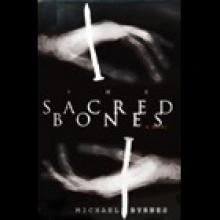 The Sacred Bones
The Sacred Bones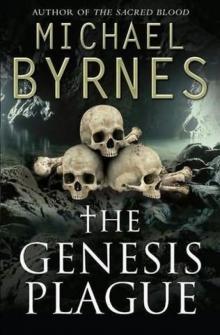 The Genesis Plague (2010)
The Genesis Plague (2010)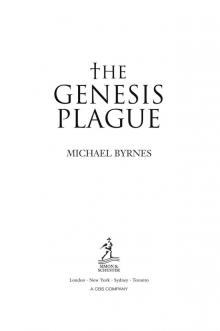 The Genesis Plague
The Genesis Plague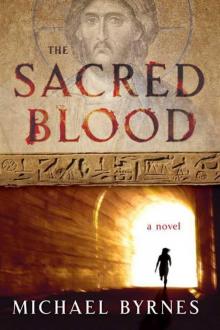 The Sacred Blood
The Sacred Blood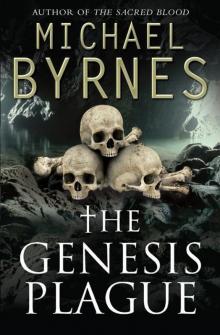 The Genesis Plague tf-1
The Genesis Plague tf-1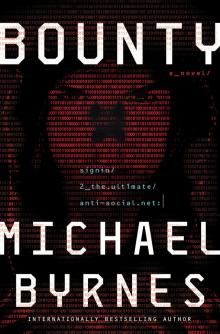 Bounty
Bounty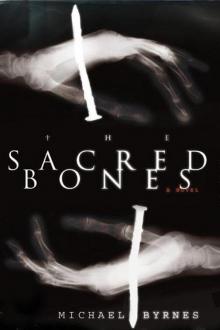 Sacred Bones : A Novel
Sacred Bones : A Novel